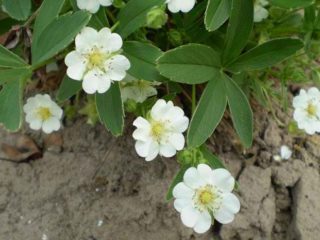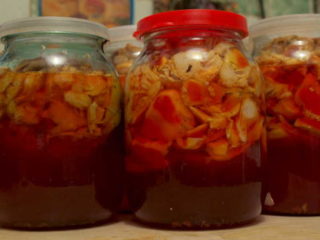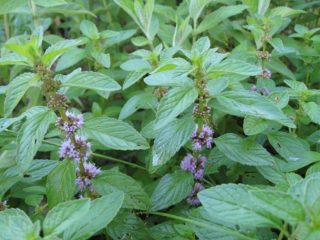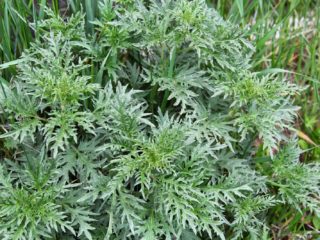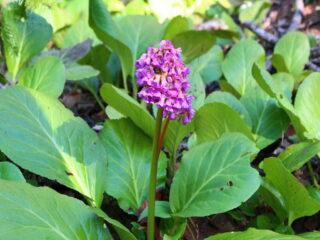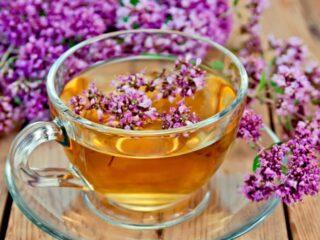Content
- 1 What is fennel and what does it look like?
- 2 What does fennel taste like?
- 3 Chemical composition and calorie content of fennel
- 4 Health benefits and harms
- 5 Fennel for breastfeeding
- 6 Is it possible to eat fennel during pregnancy?
- 7 Fennel in folk medicine
- 8 Use in cooking
- 9 Side effects and contraindications
- 10 Conclusion
- 11 Reviews on the use of fennel
The use of fennel seeds benefits the body. But you need to consume medicinal raw materials according to proven algorithms.
What is fennel and what does it look like?
Common fennel (Foeniculum vulgare) is a perennial or annual plant of the Apiaceae family. It has a fleshy spindle-like root, branched in the upper part, and a straight, thin-ribbed stem up to 2 m tall. The leaves of the plant are three- and four-times pinnately dissected, triangular in shape, arranged in a regular order.
In July and August, the culture blooms with yellow flowers, collected in double umbrellas up to 15 cm wide. In September it bears greenish-brown fruits, splitting into two half-fruits.
In its natural form, the grass is distributed in North Africa, Western and South-Eastern Europe, Asia and New Zealand, South and North America. In Russia it is found in steppe regions in warm climates.
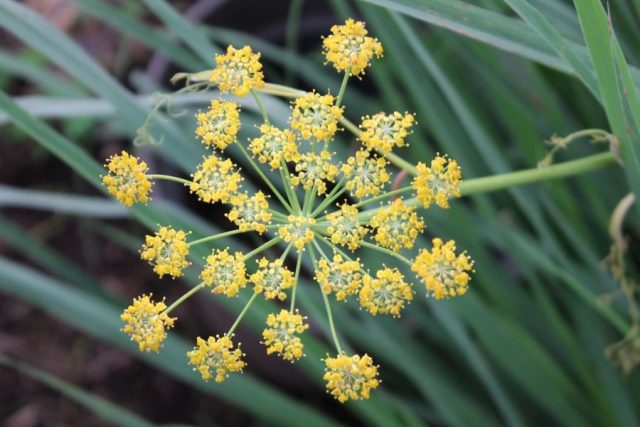
Fennel grows on rocky, dry soils, near roads and in vacant lots.
What does fennel taste like?
Both greens and seeds of the crop are suitable for use as food. The stems and leaves of the plant have a pleasant sweetish taste. The seeds and tubers are slightly reminiscent of anise and dill. In cooking, the plant is used as a spice, and is also consumed fresh in salads and desserts.
Chemical composition and calorie content of fennel
The beneficial properties of fennel fruits are determined by the chemical composition of the plant. The seeds and green parts contain:
- ascorbic acid;
- manganese and zinc;
- phosphorus and calcium;
- vitamins A and PP;
- essential oils;
- fatty acid;
- vitamins B1, B2 and B6;
- magnesium and potassium;
- sodium and iron;
- copper.
The nutritional value of the product is quite high - about 345 calories per 100 g. Fats account for approximately 14.8 g of the composition; proteins and carbohydrates account for 15 g and 12.5 g each.
Health benefits and harms
Indications for the use of fennel recommend using the plant for a wide variety of ailments. When used correctly, the seeds of the crop:
- relieve spasms of the stomach and intestines;
- eliminate heartburn and relieve heaviness in the epigastric region;
- prevent the development of vitamin deficiency;
- fight inflammation and infections;
- have a calming effect on the nervous system;
- help get rid of stress and insomnia;
- promote expectoration when coughing;
- reduces temperature during flu and colds;
- accelerate tissue healing from wounds, cuts and other injuries;
- dilate blood vessels and reduce blood pressure;
- improve the functioning of the cardiac system and prevent strokes and heart attacks;
- due to laxative properties eliminate constipation;
- improve kidney function and remove swelling;
- reduce the load on the liver and promote its recovery;
- slow down aging and protect against the development of cancer.
The herb can be used to care for facial skin. Products based on plant seeds have a mild whitening effect, increase the tone of the epidermis and restore its elasticity. Using a decoction of healthy seeds for hair strengthens curls and gives them strength and shine.
Fennel for women
The benefits of fennel tea are especially pronounced for the female body. The seeds of the plant are recommended for use in case of cycle failures. The grains contain phytoestrogens that regulate a woman’s hormonal levels. It is allowed to use infusions and decoctions during menopause to normalize the physical and emotional state.
The plant can be used to stimulate lactation. When used correctly, the herb enhances breast milk production and has virtually no effect on taste.
Benefits for men
Eating fennel is recommended not only for women, but also for men. The plant has the properties of a natural aphrodisiac, increases potency and does not cause harm to health.
The use of the herb has a beneficial effect on the liver. Healthy seeds help cleanse and restore it, remove waste and toxins from the body.
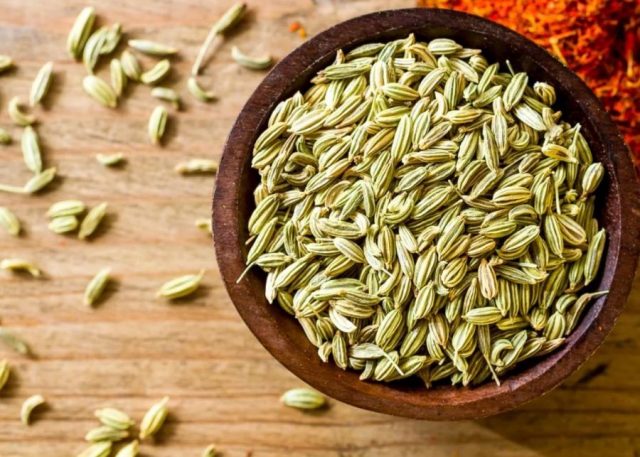
It is recommended for men to use fennel after poisoning and along with heavy heavy meals to speed up digestion.
Benefits for children
If you follow the basic rules, you can brew fennel even for a small child.Infusions and teas made from healthy seeds help with cramps and colic in the intestines, heartburn and belching in babies. The use of the plant also has a beneficial effect on colds. The seeds have expectorant properties and speed up recovery from coughs.
However, offering fresh fennel to children under two years of age is prohibited. Only heat-treated greens and boiled seeds are suitable for use for medicinal purposes.
Fennel for weight loss
It is recommended to use fennel in food if you are prone to excess weight. The seeds of the plant muffle the feeling of hunger and help maintain a diet without breakdowns. Useful raw materials, when used in moderation, normalize digestive processes and improve the absorption of valuable substances.
Grass seeds help remove toxic substances and waste from the body, and also have mild diuretic properties. Using a healthy plant on a diet helps get rid of swelling and cleanse the intestines.
Fennel for breastfeeding
Healthy fennel seeds and its greens stimulate milk production in women during lactation. The natural remedy not only brings good results, but also remains safe for use. The plant does not have any negative effect on the composition of milk, does not spoil its taste and very rarely causes allergic reactions in a child.
Is it possible to eat fennel during pregnancy?
While carrying a child, the beneficial herb should be discarded. Despite the fact that the seeds help cope with attacks of toxicosis, the harm from their use can be quite severe.
Studies show that consuming the spice increases the risk of miscarriage in pregnant women. Generally beneficial, fennel, when used, provokes active contractions of the uterine muscles, which poses a danger both in the early and late stages.
Fennel in folk medicine
Fennel helps against many diseases, so traditional medicine offers numerous recipes for decoctions and infusions based on it. The seeds of the plant are mainly used as useful raw materials, but sometimes the green parts and roots are also used.
Fennel for cough
For colds, fennel thins mucus, improves expectoration and helps quickly get rid of cough. Traditional medicine advises preparing the following remedy for use:
- The seeds of the beneficial plant are ground into a homogeneous powder.
- Pour the resulting raw material into a glass container in a volume of 5 g.
- Pour a glass of hot water.
- Boil over low heat for about half an hour.
After the expiration date, remove the useful product from the stove and leave for an hour under the lid. Then the broth is filtered and consumed three times a day, 30 ml.
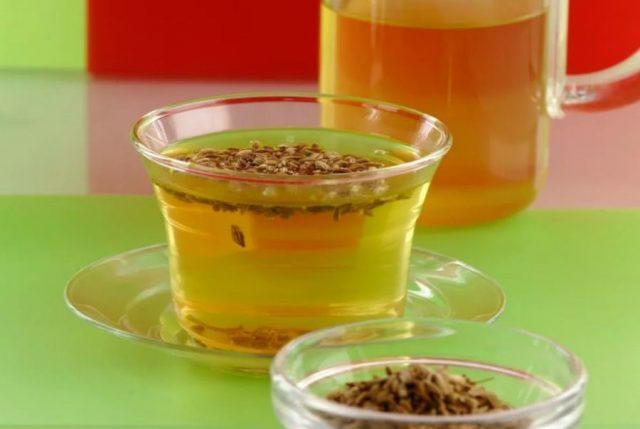
Before using a beneficial fennel decoction for coughing, it is recommended to warm the drink
Fennel for colic in newborns
The herb has antispasmodic properties and rarely causes negative reactions in the body. The plant is recommended for use in colic in newborns. The decoction can be prepared in the following way:
- The seeds are washed in warm, clean water.
- Grind 15 g of raw materials in a coffee grinder.
- The resulting mass is brewed with 100 ml of boiling water and left to cool completely.
The baby should be given a healthy decoction 20 minutes before feeding, 5-10 ml.In this case, fennel for the intestines, when used, will have time to have a beneficial effect and prevent the development of spasms. If the child does not like the taste, it is allowed to dilute the drug in warm milk.
Fennel for pancreatitis
Healthy fennel improves the functioning of the pancreas and avoids exacerbation of pancreatitis. It cannot serve as a full-fledged medicine - with existing inflammation, it is important to first cope with the symptoms with the help of medications. After this, it is allowed to include useful herbs in the treatment regimen for a speedy improvement of the condition.
The following remedy has a good effect when used:
- About 15 g of seeds are ground to a powder.
- Pour 250 ml of hot water into the raw material.
- Leave covered for an hour.
The finished useful preparation is filtered from the sediment through gauze. You need to take 100 ml of fennel four times a day.
Fennel for constipation
Healthy fennel seeds have laxative properties and help relieve constipation. A medicine based on fruits is prepared as follows:
- Pour about 10 g of seeds into an enamel container.
- Pour a glass of boiling water over the healthy raw material.
- Place in a water bath for 15 minutes.
- Leave covered for 45 minutes.
The finished product must be filtered and topped up with clean water to 250 ml. It is recommended to take the infusion 80 ml up to four times a day on an empty stomach.
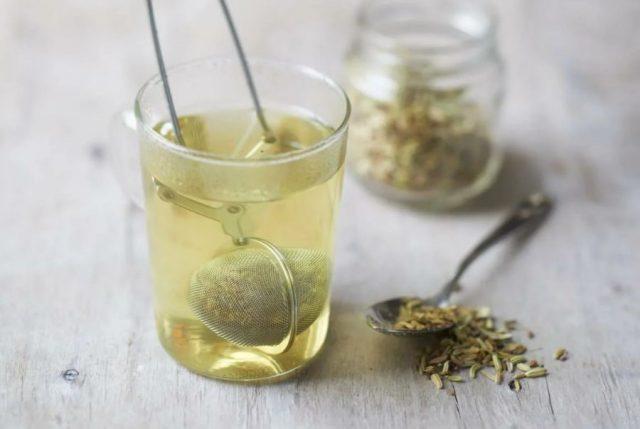
Fennel infusion not only relieves constipation, but also generally improves bowel function with regular use.
Fennel for heartburn
Fennel for the stomach is recommended for use in cases of frequent heartburn. The seeds of a healthy plant normalize acidity, accelerate the absorption of food and remove unpleasant sensations. The remedy is done as follows:
- Pour 10 g of seeds into 300 ml of boiling water.
- Leave covered for three hours.
- After the period has passed, filter.
You need to take the product 100 ml three times a day. The infusion also has diuretic properties and helps get rid of swelling.
Fennel and blood pressure
Healthy fennel has a beneficial effect on blood pressure, normalizes the functioning of the cardiovascular system and helps cope with chronic migraines. An infusion based on seeds is made as follows:
- Pour 300 ml of hot water into about 10 g of fruit.
- Place on low heat for an hour.
- After the expiration date, filter and top up to the initial volume.
You need to drink the infusion 100 ml three times a day. Treatment is continued for three weeks.
Use in cooking
Fennel is actively used not only in home medicine, but also in cooking. All parts of the useful plant are suitable for food use. In particular, tubers are baked with meat, fish or vegetables, added to stuffed dishes and added to sauces.
Fennel leaves are used in salads. They have a pleasant taste and refreshing aroma. In crushed form, the plates are also used in marinades, sauces and pickles. Fennel seeds are found in salads, main courses, sausages and baked goods. They add spicy notes to products and improve aroma.
Side effects and contraindications
With numerous valuable properties, beneficial fennel seeds and other parts can cause harm to the body.Avoid using herbal products by:
- with individual intolerance;
- during pregnancy;
- with exacerbation of pancreatitis and peptic ulcer;
- for epilepsy.
When used in moderation, the seeds rarely have a negative effect on the body. But an overdose can lead to side effects. In particular, fennel can cause nausea and diarrhea, abdominal pain and dizziness. If you have an allergy, skin redness and rashes may occur.
If side effects occur after using a beneficial herb, you must immediately stop using the plant. There is usually no need to see a doctor. Skin rashes, indigestion and other symptoms go away on their own. If the body’s negative reaction is not caused by an allergy, after the condition has normalized, the plant can again be used for medicinal purposes. But the dosages are being reduced.
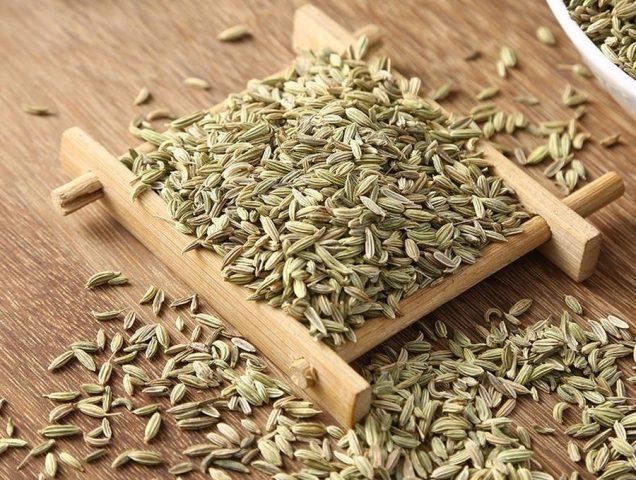
Fennel seeds should be consumed with extreme caution if you have severely low blood pressure.
Conclusion
The use of fennel seeds has a beneficial effect on the body for digestive ailments. Raw materials improve peristalsis and cleanse the intestines, eliminate spasms and pain. However, it should be consumed in small quantities in accordance with recipes.
Reviews on the use of fennel
https://youtu.be/YDy486LB8zA
